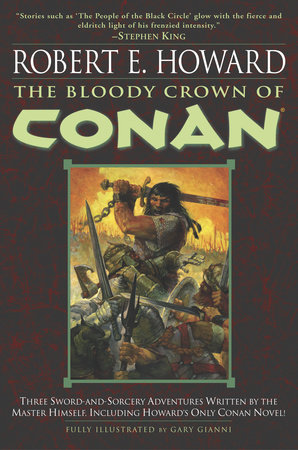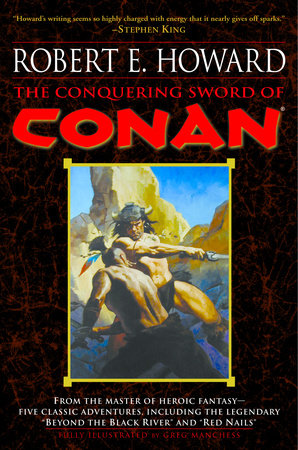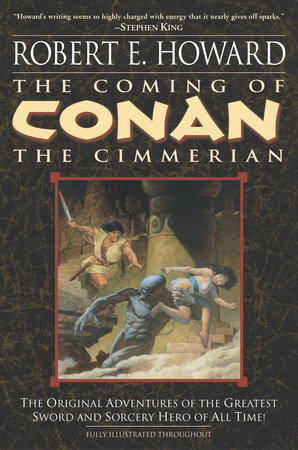Excerpt
The Bloody Crown of Conan
Chapter 1
The People of the Black Circle I
Death Strikes a King
The king of Vendhya was dying. Through the hot, stifling night the temple gongs boomed and the conchs roared. Their clamor was a faint echo in the gold-domed chamber where Bunda Chand struggled on the velvet-cushioned dais. Beads of sweat glistened on his dark skin; his fingers twisted the gold-worked fabric beneath him. He was young; no spear had touched him, no poison lurked in his wine. But his veins stood out like blue cords on his temples, and his eyes dilated with the nearness of death. Trembling slave-girls knelt at the foot of the dais, and leaning down to him, watching him with passionate intensity, was his sister, the Devi Yasmina. With her was the wazam, a noble grown old in the royal court.
She threw up her head in a gusty gesture of wrath and despair as the thunder of the distant drums reached her ears.
"The priests and their clamor!" she exclaimed. "They are no wiser than the leeches who are helpless! Nay, he dies and none can say why. He is dying now - and I stand here helpless, who would burn the whole city and spill the blood of thousands to save him."
"Not a man of Ayodhya but would die in his place, if it might be, Devi," answered the wazam. "This poison - "
"I tell you it is not poison!" she cried. "Since his birth he has been guarded so closely that the cleverest poisoners of the East could not reach him. Five skulls bleaching on the Tower of the Kites can testify to attempts which were made - and which failed. As you well know, there are ten men and ten women whose sole duty is to taste his food and wine, and fifty armed warriors guard his chamber as they guard it now. No, it is not poison; it is sorcery - black, ghastly magic - "
She ceased as the king spoke; his livid lips did not move, and there was no recognition in his glassy eyes. But his voice rose in an eery call, indistinct and far away, as if he called to her from beyond vast, wind-blown gulfs.
"Yasmina! Yasmina! My sister, where are you? I can not find you. All is darkness, and the roaring of great winds!"
"Brother!" cried Yasmina, catching his limp hand in a convulsive grasp. "I am here! Do you not know me - "
Her voice died at the utter vacancy of his face. A low confused moaning waned from his mouth. The slave-girls at the foot of the dais whimpered with fear, and Yasmina beat her breast in her anguish.
In another part of the city a man stood in a latticed balcony overlooking a long street in which torches tossed luridly, smokily revealing upturned dark faces and the whites of gleaming eyes. A long-drawn wailing rose from the multitude.
The man shrugged his broad shoulders and turned back into the arabesqued chamber. He was a tall man, compactly built, and richly clad.
"The king is not yet dead, but the dirge is sounded," he said to another man who sat cross-legged on a mat in a corner. This man was clad in a brown camel-hair robe and sandals, and a green turban was on his head. His expression was tranquil, his gaze impersonal.
"The people know he will never see another dawn," this man answered.
The first speaker favored him with a long, searching stare.
"What I can not understand," he said, "is why I have had to wait so long for your masters to strike. If they have slain the king now, why could they not have slain him months ago?"
"Even the arts you call sorcery are governed by cosmic laws," answered the man in the green turban. "The stars direct these actions, as in other affairs. Not even my masters can alter the stars. Not until the heavens were in the proper order could they perform this necromancy." With a long, stained finger-nail he mapped the constellations on the marble-tiled floor. "The slant of the moon presaged evil for the king of Vendhya; the stars are in turmoil, the Serpent in the House of the Elephant. During such juxtaposition, the invisible guardians are removed from the spirit of Bhunda Chand. A path is opened in the unseen realms, and once a point of contact was established, mighty powers were put in play along that path."
"Point of contact?" inquired the other. "Do you mean that lock of Bhunda Chand's hair?"
"Yes. All discarded portions of the human body still remain part of it, attached to it by intangible connections. The priests of Asura have a dim inkling of this truth, and so all nail-trimmings, hair and other waste products of the persons of the royal family are carefully reduced to ashes and the ashes hidden. But at the urgent entreaty of the princess of Khosala, who loved Bhunda Chand vainly, he gave her a lock of his long black hair as a token of remembrance. When my masters decided upon his doom, the lock, in its golden, jewel-crusted case, was stolen from under her pillow while she slept, and another substituted, so like the first that she never knew the difference. Then the genuine lock travelled by camel-caravan up the long, long road to Peshkhauri, thence up the Zhaibar Pass, until it reached the hands of those for whom it was intended."
"Only a lock of hair," murmured the nobleman.
"By which a soul is drawn from its body and across gulfs of echoing space," returned the man on the mat.
The nobleman studied him curiously.
"I do not know if you are a man or a demon, Khemsa," he said at last. "Few of us are what we seem. I, whom the Kshatriyas know as Kerim Shah, a prince from Iranistan, am no greater a masquerader than most men. They are all traitors in one way or another, and half of them know not whom they serve. There at least I have no doubts; for I serve King Yezdigerd of Turan."
"And I the Black Seers of Yimsha," said Khemsa; "and my masters are greater than yours, for they have accomplished by their arts what Yezdigerd could not with a hundred thousand swords."
Outside, the moan of the tortured thousands shuddered up to the stars which crusted the sweating Vendhyan night, and the conchs bellowed like oxen in pain.
In the gardens of the palace the torches glinted on polished helmets and curved swords and gold-chased corselets. All the noble-born fighting-men of Ayodhya were gathered in the great palace or about it, and at each broad-arched gate and door fifty archers stood on guard, with bows in their hands. But Death stalked through the royal palace and none could stay his ghostly tread.
On the dais under the golden dome the king cried out again, racked by awful paroxysms. Again his voice came faintly and far away, and again the Devi bent to him, trembling with a fear that was darker than the terror of death.
"Yasmina!" Again that far, weirdly dreeing cry, from realms immeasurable. "Aid me! I am far from my mortal house! Wizards have drawn my soul through the wind-blown darkness. They seek to snap the silver cord that binds me to my dying body. They cluster around me; their hands are taloned, their eyes are red like flame burning in darkness. Aie, save me, my sister! Their fingers sear me like fire! They would slay my body and damn my soul! What is this they bring before me? - Aie!"
At the terror in his hopeless cry Yasmina screamed uncontrollably and threw herself bodily upon him in the abandon of her anguish. He was torn by a terrible convulsion; foam flew from his contorted lips and his writhing fingers left their marks on the girl's shoulders. But the glassy blankness passed from his eyes like smoke blown from a fire, and he looked up at his sister with recognition.
"Brother!" she sobbed. "Brother - "
"Swift!" he gasped, and his weakening voice was rational. "I know now what brings me to the pyre. I have been on a far journey and I understand. I have been ensorceled by the wizards of the Himelians. They drew my soul out of my body and far away, into a stone room. There they strove to break the silver cord of life, and thrust my soul into the body of a foul night-weird their sorcery summoned up from hell. Ah! I feel their pull upon me now! Your cry and the grip of your fingers brought me back, but I am going fast. My soul clings to my body, but its hold weakens. Quick - kill me, before they can trap my soul for ever!"
"I can not!" she wailed, smiting her naked breasts.
"Swiftly, I command you!" There was the old imperious note in his failing whisper. "You have never disobeyed me - obey my last command! Send my soul clean to Asura! Haste, lest you damn me to spend eternity as a filthy gaunt of darkness. Strike, I command you! Strike!"
Sobbing wildly, Yasmina plucked a jeweled dagger from her girdle and plunged it to the hilt in his breast. He stiffened and then went limp, a grim smile curving his dead lips. Yasmina hurled herself face-down on the rush-covered floor, beating the reeds with her clenched hands. Outside, the gongs and conchs brayed and thundered and the priests gashed themselves with copper knives.
II
A Barbarian from the Hills
Chunder Shan, governor of Peshkhauri, laid down his golden pen and carefully scanned that which he had written on parchment that bore his official seal. He had ruled Peshkhauri so long only because he weighed his every word, spoken or written. Danger breeds caution, and only a wary man lives long in that wild country where the hot Vendhyan plains meet the crags of the Himelians. An hour's ride westward or northward and one crossed the border and was among the hills where men lived by the law of the knife.
The governor was alone in his chamber, seated at his ornately-carven table of inlaid ebony. Through the wide window, open for the coolness, he could see a square of the blue Himelian night, dotted with great white stars. An adjacent parapet was a shadowy line, and further crenelles and embrasures were barely hinted at in the dim starlight. The governor's fortress was strong, and situated outside the walls of the city it guarded. The breeze that stirred the tapestries on the wall brought faint noises from the streets of Peshkhauri - occasional snatches of wailing song, or the thrum of a cithern.
The governor read what he had written, slowly, with his open hand shading his eyes from the bronze butter-lamp, his lips moving. Absently, as he read, he heard the drum of horses' hoofs outside the barbican, the sharp staccato of the guards' challenge. He did not heed, intent upon his letter. It was addressed to the wazam of Vendhya, at the royal court of Ayodhya, and it stated, after the customary salutations:
"Let it be known to your excellency that I have faithfully carried out your excellency's instructions. The seven tribesmen are well guarded in their prison, and I have repeatedly sent word into the hills that their chief come in person to bargain for their release. But he has made no move, except to send word that unless they are freed he will burn Peshkhauri and cover his saddle with my hide, begging your excellency's indulgence. This he is quite capable of attempting, and I have tripled the numbers of the lance guards. The man is not a native of Ghulistan. I can not with certainty predict his next move. But since it is the wish of the Devi - "
He was out of his ivory chair and on his feet facing the arched door, all in one instant. He snatched at the curved sword lying in its ornate scabbard on the table, and then checked the movement.
It was a woman who had entered unannounced, a woman whose gossamer robes did not conceal the rich garments beneath any more than they concealed the suppleness and beauty of her tall, slender figure. A filmy veil fell below her breasts, supported by a flowing head-dress bound about with a triple gold braid and adorned with a golden crescent. Her dark eyes regarded the astonished governor over the veil, and then with an imperious gesture of her white hand, she uncovered her face.
"Devi!" The governor dropped to his knee before her, his surprize and confusion somewhat spoiling the stateliness of his obeisance. With a gesture she motioned him to rise, and he hastened to lead her to the ivory chair, all the while bowing level with his girdle. But his first words were of reproof.
"Your majesty! This was most unwise! The border is unsettled. Raids from the hills are incessant. You came with a large attendance?"
"An ample retinue followed me to Peshkhauri," she answered. "I lodged my people there and came on to the fort with my maid, Gitara."
Chunder Shan groaned in horror.
"Devi! You do not understand the peril. An hour's ride from this spot the hills swarm with barbarians who make a profession of murder and rapine. Women have been stolen and men stabbed between the fort and the city. Peshkhauri is not like your southern provinces - "
"But I am here, and unharmed," she interrupted with a trace of impatience. "I showed my signet ring to the guard at the gate, and to the one outside your door, and they admitted me unannounced, not knowing me, but supposing me to be a secret courier from Ayodhya. Let us not now waste time.
"You have received no word from the chief of the barbarians?"
"None save threats and curses, Devi. He is wary and suspicious. He deems it a trap, and perhaps he is not to be blamed. The Kshatriyas have not always kept their promises to the hill people."
"He must be brought to terms!" broke in Yasmina, the knuckles of her clenched hands showing white.
"I do not understand." The governor shook his head. "When I chanced to capture these seven hillmen, I reported their capture to the wazam, as is the custom, and then, before I could hang them, there came an order to hold them and communicate with their chief. This I did, but the man holds aloof, as I have said. These men are of the tribe of Afghulis, but he is a foreigner from the west, and he is called Conan. I have threatened to hang them tomorrow at dawn, if he does not come."
"Good!" exclaimed the Devi. "You have done well. And I will tell you why I have given these orders. My brother - " she faltered, choking, and the governor bowed his head, with the customary gesture of respect for a departed sovereign.






